[[{“value”:”Story by Graciela Casillas
Photos by Mary Beth Wilkas Janke
Thank you for reading this post, don't forget to follow and signup for notifications!
When we talk about women stepping into male dominated spaces, we’re not just talking about walking into an office where the culture is thick with machismo or skepticism. We’re talking about walking into danger – into professions where the cost of a mistake can be life or death. Dr. Mary Beth Wilkas Janke, author of The Protector: A Woman’s Journey from the Secret Service to Protecting VIPs in the World’s Most Dangerous Places, didn’t just step into that world; she built her career in it. From her early years as a Secret Service agent to her high-risk assignments in Haiti, Colombia and Peru, she carved out her authority in a field where women were rarely seen and often doubted.
I sat down with Janke to talk about her book, her journey through Hollywood, corporate and overseas protection (a rare
trifecta in the security field), and what it means to embody the role of protector. What emerged was more than a career
narrative. It was a story of grit, resilience and integrity, qualities that define every woman who dares to thrive where she isn’t expected to survive.

JANKE’S JOURNEY INTO protection wasn’t born out of chance, but rather it was sparked by a teenage realization. In high school, she took a law elective, a class she barely remembers the name of, but one that left her with a crystal clear calling: “I came home that day and told my parents, ‘I’m going to be an FBI agent.’
That dream took her to college for criminal justice and eventually into the federal system. But as so many of us know, dreams rarely unfold in a straight line. The FBI door closed, but the Secret Service opened. She’d applied to both the DEA and Secret Service, and the call came faster than expected. Nine months, not two years. A bilingual female applicant, tall and athletic – that combination made her stand out. But standing out is a double-edged sword. In a male-dominated profession, being noticed is as much a burden as it is an opportunity.
“There weren’t a lot of mentors. My mentor was hitting the ground running, learning as I went.”
“How do you carve out authority in environments where people don’t expect you to succeed?” I asked her. It’s the question every woman in these fields faces. Her response was simple but powerful: “Never let them see you sweat.” It wasn’t bravado; it was survival. When fellow trainees asked her, point blank, why she was even there, she didn’t flinch. She smiled, threw the comment back, and kept going. “I knew I belonged,” she told me. “My résumé, my athleticism, my drive – it all added up. I chose this life because it was hard, because it was male-dominated, and because it would make me better.”
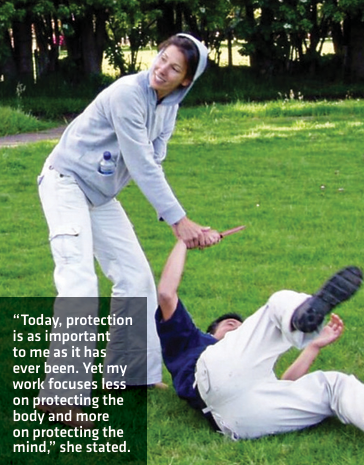
I understood her immediately. As a fighter, I had walked into gyms where I wasn’t welcome, heard whispers that I was “too pretty to fight,” been told to smile instead of strike. Like Janke, I chose to let those voices fuel me rather than break me. Women in these professions don’t just face the challenge of the job; they face the challenge of proving they deserve to do the job. For women in protection, mentorship was scarce. “There weren’t a lot of mentors,” Janke admitted. “My mentor was hitting the ground running, learning as I went.” When there’s no one to lean on, you build your own resilience. For her, the outlet was physical – running, training, sweating it out. The weight of the job didn’t disappear, but it became manageable through action.
It reminded me of the countless times I worked through my own frustrations by hitting the bag until my knuckles ached. The body becomes the pressure valve for the mind. For women in high-risk professions, the gym, the run or the fight isn’t just training, it’s therapy.
JANKE’S DEFINING MOMENT didn’t come during her short tenure with the Secret Service. It came later, in the private sector, on missions that demanded not just presence but mastery. Her most defining assignment took her to Colombia, a place where assassination attempts were a constant reality and trust was a fragile currency. She was assigned as the US Security Advisor to the Minister of Defense and Vice President. The risk was immense, but so was the responsibility. It was there that she stopped questioning whether she belonged. “I realized I wasn’t just guarding others,” she said. “I was the embodiment of protection itself. I knew I was good at it. And I didn’t care what anyone thought anymore. I had a job to do, and I was damn sure nothing was going to happen on my watch.”
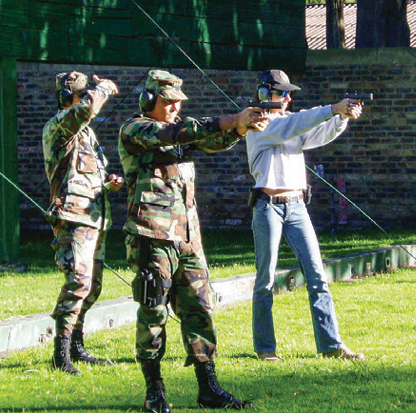
In Colombia, her gender was not an obstacle, but rather an asset. The Minister of Defense at the time was a woman and she wanted a female advisor. Janke’s presence was strategic: a woman who would not be another man hovering in a position of control; a woman who could be trusted in a world where corruption was everywhere. Even beyond that, being underestimated became her hidden weapon. “Nobody expected me to be carrying a weapon,” she laughed. “That gave me extra seconds – seconds that could save lives.” Sometimes the very thing the world sees as weakness is the thing that keeps you alive.
“Nobody expected me to be carrying a weapon. That gave me extra seconds – seconds that could save lives.”
MOST PEOPLE THINK protection is about what happens when bullets fly or threats emerge. But anyone who’s walked that line knows the truth: protection is prevention. Janke emphasized this with conviction. “The two most important facets of protection are advance work and motorcades. If you do the work ahead of time – study the terrain, read the people, build the local intel – you prevent the attack before it happens.” For her, charisma was as much a weapon as a firearm. Talking to locals and having the gift of gab helped her attain information and build trust; these skills kept her and her protectees alive. It was a reminder that in this field, brains and presence are just as critical as muscle and firepower.
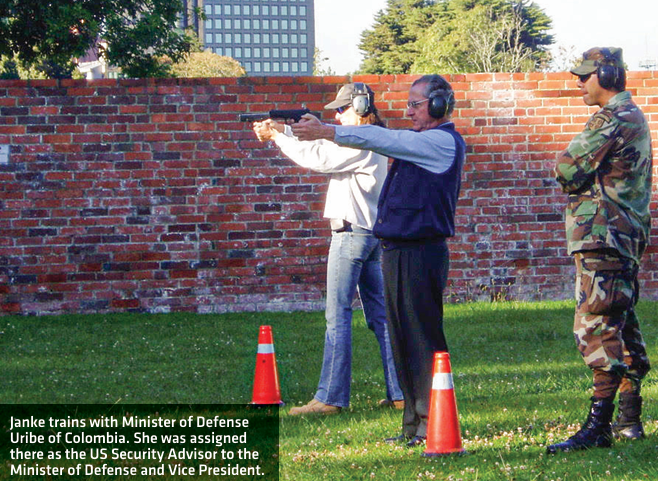
The darker side of the job wasn’t just danger, it was temptation – clients who blurred lines and colleagues who crossed them. Janke was unwavering: “Never cross the line with a client. I don’t care if I was broke; I would have quit before compromising my integrity.” Her grounding came from her upbringing, from values instilled in her Catholic household. Integrity wasn’t negotiable. Protection wasn’t just about guarding bodies; it was about guarding one’s own moral compass in a world where compromise was always knocking.
Of course, threats and fear were part of the job. In Colombia, one evening Janke and her team were told bluntly that the guerilla group FARC, the Revolutionary Armed Forces of Colombia, had a contract out on their lives. “Did it change anything for me? No,” she said. “I was already on my toes every day. You can’t afford complacency. You do it scared if you have to, but you do it.” That statement hit me deeply. In the ring, fear sharpens you. On the street, fear keeps you alive. Women in high-risk professions don’t eliminate fear; they dance with it. They use it.


EVENTUALLY, JANKE
TRANSITIONED from the field into psychology, bringing with her the lessons of resilience and mindset. She still trains, still holds herself to the discipline of readiness, but her mission now is to help others build mental strength. She looks back with pride, not because it was easy but because she did it all in an arena that wasn’t designed for her. She thrived anyway. When I asked what message she most wanted women to carry from her journey, her answer was immediate: “That they belong, if they want it. It’s a mindset shift. What you tell yourself manifests in everyday life. Tell yourself you belong, and you will.” It wasn’t about demanding fairness or waiting for doors to open. It was about walking through them, ready, resilient and determined.
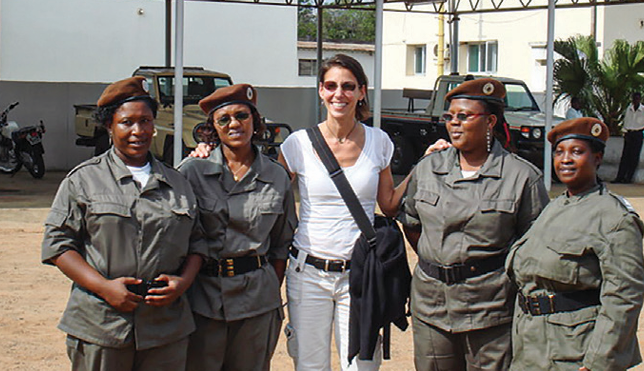
As we spoke, I couldn’t help but hear echoes of my own journey. The rings I fought in and the missions Janke carried out may look different on the surface, but the fight was the same: proving worth, carving space, standing tall when others expect you to shrink. For every woman who has ever been told she doesn’t belong, Janke’s story is proof that belonging
is not granted – it’s claimed. Women like Dr. Mary Beth Wilkas Janke remind us that protection isn’t just a profession, but rather it’s a calling. It demands strength, resilience and integrity. It demands facing fear without letting it paralyze you. And above all, it demands that you know, deep down, that you belong, even when no one else believes it. In a world that still questions women in arenas of risk, her story stands as a battle cry: Step in, stand firm and never let them see you sweat. ★
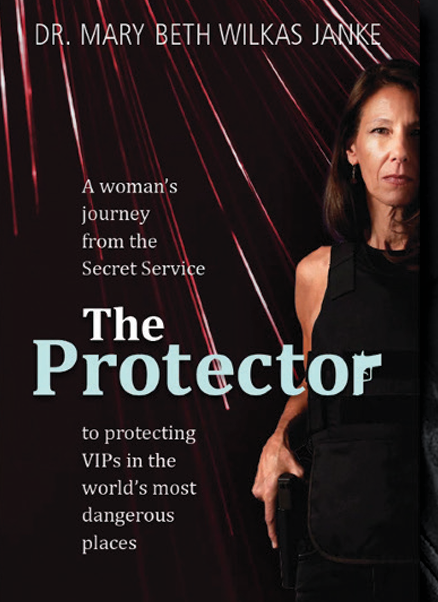
Editor’s note: Author Graciela Casillas is a certified personal protection specialist who works as a staff instructor with Executive Security International bodyguard school (esibodyguardschool.com). She is also an advanced firearms trainer and has worked with many world-class firearms instructors. She has authored many articles on the subject for various publications and holds a bachelor’s degree in law and society, master’s degrees in education and physical education, and lifetime teaching credentials in psychology
“}]]



